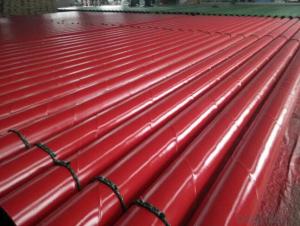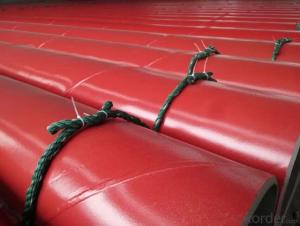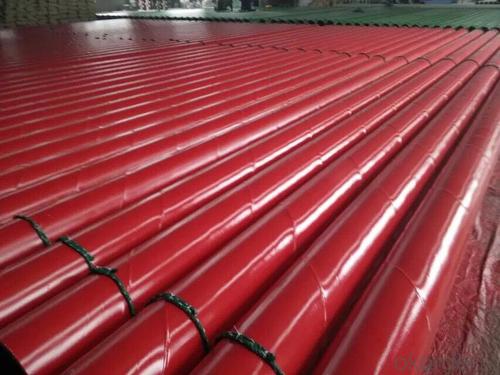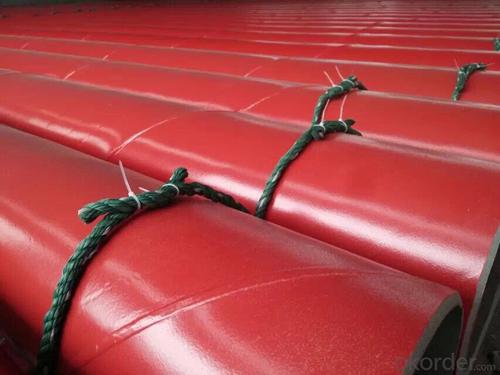ERW 3PE steel pipe external coating
- Loading Port:
- China Main Port
- Payment Terms:
- TT or LC
- Min Order Qty:
- 100m.t. m.t.
- Supply Capability:
- 40000m.t. m.t./month
OKorder Service Pledge
OKorder Financial Service
You Might Also Like
Specifications
water pipeline inner-layer tape
1 Butyl rubber as adhesive
2.SGS test report and DVGW certificate
3.corrosion protection
water pipeline inner-layer tape
State-of-the-Art Pipeline Protection for All Climates & Environments
System description:
WATER PIPELINE Inner -layer tape also be called pipe wrap anti-corrosion tape, polyethylene wrap tape.
water pipeline Inner-layer tapeT100 is engineered to assure a high bond to the primed pipe surface with excellent conformability characteristics, aggressive adhesive for corrosion protection and repair of main line coatings.
Inner-layer tapeT100 series is cold applied tape coating system for corrosion protection of Oil, Gas, Petrochemical, and Waste Waterburied pipeline, pipe can be buried, also can be underground ,overhead ,onshore and offshore .
Structure of water pipeline inner wrap tape
The specification of the tape consists of two layers, adhesive layer and film backing
Adhesive: butyl rubber
Film backing: Special blend of stabilized polyethylene
Features & Benefits
Provides a permanent bond to the primed steel pipes surface and provides protection against chemical electrolytic corrosion for underground pipelines.
long term corrosion protection
Worldwide reference lists. Established in-ground history
High chemical resistance under service temperature.
Outstanding electric property and permanent adhesion.
Cold applied, No release liner. Makes installation fast and easy.
Complies with EN-DIN 30672 and AWWAC-214 international standards and also ASTM standards.
Be used for water pipeline corrosion protection
System Properties
Type | T138 | T 150 | T165 | T180 | T 250 | T265 | T280 | |
Thickness | 15mil 0.38mm | 20mil 0.508mm | 25mil 0.635mm | 30mil 0.762mm | 20mil 0.508mm | 25mil 0.635mm | 30mil 0.762mm | |
Backing | 9mil 0.229mm | 9mil 0.241mm | 10mil 0.25mm | 10mil 0.25mm | 15mil 0.38mm | 20mil 0.508mm | 25mil 0635mm | |
Adhesive | 6mil 0.152mm | 11mil 0.279mm | 15mil 0.381mm | 20mil 0.508mm | 5mil 0.127mm | 5mil 0.127mm | 5mil 0.127mm | |
When used for ductile iron pipes inner layer 980-20 or 980-25 and outer layer 955-20 or 955-25 are recommended. | ||||||||
Elongation | ³300% | ³400% | ||||||
Tensile Strength | 55 N/cm | 70 N/cm | ||||||
Color | Black | White | ||||||
Peel Adhesion to Primed Pipe | 33 N/cm | |||||||
Dielectric Strength | 30 KV | |||||||
Dielectric Breakdown | 26 KV/mm | |||||||
Cathodic Disbandment | 0.24 in radius 6.4 mm | |||||||
Water Vapor Transmission Rate | < 0.1% | |||||||
Volume Resistivity | 2.5 x 1015 ohm.cm | |||||||
Impact resistance | 5.5Nm | |||||||
Penetration Resistance | <15% | |||||||
Performance | AWWA C-209,ASTM D 1000,EN 12068 | |||||||
Order information
Length | 100ft(30 M),200ft(60 M),400ft(120 M),800ft(240 M) |
Width | 2’’(50mm),4’’(100mm),6’’(150mm),17’(450mm),32’’(800mm) |
- Q: How are steel pipes used in the construction of desalination plants?
- Steel pipes are commonly used in the construction of desalination plants for various purposes. They are primarily utilized for the transportation of seawater and brine, as well as for the distribution of fresh water throughout the plant. Steel pipes are preferred due to their durability, corrosion resistance, and ability to withstand high pressure and extreme temperatures. Additionally, they can be easily welded together, allowing for efficient installation and maintenance.
- Q: How are steel pipes threaded for easy installation?
- The process of threading steel pipes enables convenient installation by creating grooves or ridges in the pipe, forming a spiral pattern that facilitates connection with other threaded components like fittings or valves. There are two commonly employed methods for threading steel pipes: manual threading and machine threading. Manual threading involves the utilization of a handheld tool called a pipe die. This die, equipped with sharp teeth, cuts into the pipe while it is rotated. The pipe is secured in a vise or held firmly by hand, and the die is applied to the pipe's end. As the die rotates around the pipe, threaded grooves are formed. Executing this process necessitates skill and precision to ensure accurate and properly aligned threads. In contrast, machine threading is a more automated procedure. It utilizes a pipe threading machine, which possesses a die head that automatically cuts the threads into the pipe. The machine holds the pipe securely and rotates it while the die head moves along the pipe's length, creating the threads. Machine threading is faster and more efficient than manual threading, making it ideal for large-scale production or projects. Regardless of the chosen method, it is imperative to ensure that the threads are clean and devoid of debris or burrs. This is crucial for effortless installation and to prevent leaks or other complications. Following threading, the pipes are generally inspected to ensure compliance with the required specifications. Threading steel pipes allows for uncomplicated installation as the threaded ends can be readily screwed into fittings, valves, or other pipes possessing compatible threads. This threaded connection creates a tight seal, rendering it suitable for various applications such as plumbing, gas lines, or industrial piping systems.
- Q: What are the factors to consider when selecting steel pipes for a specific application?
- When selecting steel pipes for a specific application, factors such as pipe diameter, wall thickness, material grade, corrosion resistance, temperature and pressure requirements, environmental conditions, and cost should be considered. Additionally, factors like durability, strength, weight, ease of installation, and compatibility with other components in the system should also be taken into account.
- Q: Can steel pipes be used for pharmaceutical manufacturing?
- Yes, steel pipes can be used for pharmaceutical manufacturing. Steel pipes are commonly used in various industries, including pharmaceutical manufacturing, due to their durability, strength, and resistance to corrosion. In pharmaceutical manufacturing, steel pipes are primarily used for fluid transportation, such as the transfer of chemicals, solvents, and other raw materials. They are also used for the distribution of process water, steam, and other utilities. Stainless steel pipes are particularly preferred in pharmaceutical manufacturing as they are highly resistant to corrosion and can withstand high temperatures and pressures. Moreover, stainless steel pipes have smooth surfaces, which prevent the accumulation of particles and facilitate easy cleaning and sterilization, essential requirements in pharmaceutical production. Overall, steel pipes are a reliable and suitable option for pharmaceutical manufacturing due to their robustness, resistance to corrosion, and ability to meet the stringent cleanliness and hygiene standards of the industry.
- Q: How are steel pipes protected against corrosion?
- Steel pipes are protected against corrosion through various methods such as coating them with protective materials like paint or epoxy, galvanizing them with a zinc coating, or using cathodic protection techniques such as sacrificial anodes or impressed current systems.
- Q: How do steel pipes withstand high pressure and temperature?
- The inherent properties and construction of steel pipes enable them to endure high pressure and temperature. Steel's strength and durability make it an ideal material for demanding applications. To begin with, steel pipes are crafted from top-notch steel alloys specifically engineered to withstand harsh conditions. These alloys are selected for their high tensile strength, enabling the pipes to withstand the internal pressure exerted by fluids or gases flowing through them. Often, steel used in these pipes is alloyed with elements like chromium, molybdenum, or nickel to enhance its resistance to corrosion and high temperatures. Furthermore, the construction of steel pipes plays a vital role in their ability to withstand high pressure and temperature. Typically, steel pipes are manufactured through seamless or welded processes. Seamless pipes are made by piercing a solid steel billet, resulting in a continuous and uniform pipe without any seams or joints. This seamless construction eradicates weak points and guarantees that the pipe can handle high pressure with no risk of leakage. On the other hand, welded pipes are created by joining two or more pieces of steel together using a welding process. The welds are meticulously inspected and tested to ensure their integrity and strength. Although welded pipes may have seams, they possess equal capability to endure high pressure and temperature when manufactured according to the appropriate standards. Additionally, steel pipes can be further fortified to enhance their resistance to pressure and temperature. For example, pipes used in extremely high-pressure applications may have increased thickness or additional layers of protective coatings. These measures bolster the strength and durability of the pipes, enabling them to withstand even higher pressures and temperatures. In conclusion, steel pipes can endure high pressure and temperature due to the robustness and longevity of the steel alloys used in their construction. The seamless or welded construction of these pipes eliminates weak points and guarantees their ability to handle extreme conditions. Additional reinforcement and protective coatings can be applied to further enhance their resistance to pressure and temperature.
- Q: How are steel pipes used in the manufacturing of food processing equipment?
- Steel pipes are commonly used in the manufacturing of food processing equipment due to their durability, strength, and resistance to corrosion. These pipes are used to transport various food products such as liquids, powders, and gases within the equipment. They are also utilized in the construction of frames, supports, and structures for food processing machinery, ensuring stability and longevity. Additionally, steel pipes are often employed in the creation of heat exchangers, which are crucial for heating or cooling purposes in food processing equipment.
- Q: How are steel pipes protected against soil movement or settlement?
- Steel pipes can be protected against soil movement or settlement through various methods. One common method is to use protective coatings on the pipes. These coatings act as a barrier between the steel and the soil, preventing direct contact and reducing the risk of corrosion. Some commonly used coatings include epoxy, polyethylene, and zinc. Another method is to use cathodic protection. This involves the installation of sacrificial anodes along the pipeline. These anodes corrode instead of the steel pipes, protecting them from damage caused by soil movement or settlement. Furthermore, proper design and installation techniques can also help protect steel pipes against soil movement or settlement. For instance, engineers may consider factors such as soil composition, slope stability, and potential for ground movement when designing the pipeline route. Additionally, proper trenching and bedding techniques can help ensure that the pipe is adequately supported and protected against settlement. Regular inspection and maintenance are also crucial for protecting steel pipes against soil movement or settlement. Monitoring the condition of the pipeline, including the protective coatings and cathodic protection systems, can help identify any potential issues and allow for timely repairs or replacements. Overall, a combination of protective coatings, cathodic protection, proper design and installation techniques, and regular maintenance can effectively protect steel pipes against soil movement or settlement.
- Q: What are the different methods of pipe joining using steel pipes?
- Some of the different methods of pipe joining using steel pipes include butt welding, socket welding, threaded connections, and flange connections.
- Q: How do you calculate the pipe thermal expansion coefficient for steel pipes?
- To calculate the pipe thermal expansion coefficient for steel pipes, you need to consider the material's linear expansion coefficient and the change in temperature. The linear expansion coefficient for steel is typically around 12 x 10^-6 per degree Celsius. First, determine the initial length of the pipe, which is denoted as L0. Then, measure the change in temperature, denoted as ΔT. Next, multiply the initial length of the pipe by the linear expansion coefficient and the change in temperature: ΔL = L0 * α * ΔT. The resulting value, ΔL, represents the change in length of the steel pipe due to thermal expansion.
Send your message to us
ERW 3PE steel pipe external coating
- Loading Port:
- China Main Port
- Payment Terms:
- TT or LC
- Min Order Qty:
- 100m.t. m.t.
- Supply Capability:
- 40000m.t. m.t./month
OKorder Service Pledge
OKorder Financial Service
Similar products
Hot products
Hot Searches
Related keywords




















